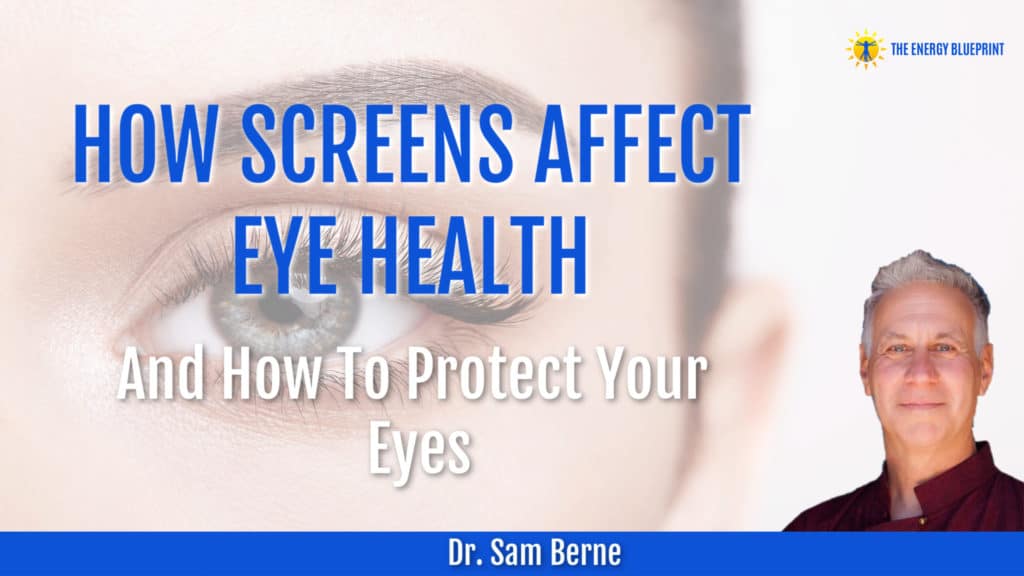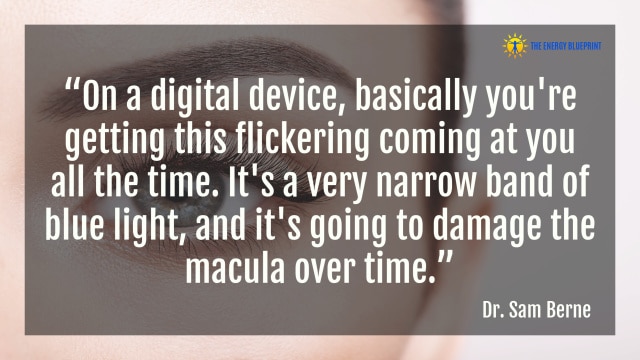 Dr. Sam Berne is a holistic optometrist. Having been diagnosed with an eye condition in early childhood, he set out on a healing journey to learn how to improve his vision. He made a full recovery, and today, he helps patients learn to naturally improve eyesight and heal the most common eye problems without surgery.
Dr. Sam Berne is a holistic optometrist. Having been diagnosed with an eye condition in early childhood, he set out on a healing journey to learn how to improve his vision. He made a full recovery, and today, he helps patients learn to naturally improve eyesight and heal the most common eye problems without surgery.
The Negative Effect of Blue Light on Eye Health

We are constantly exposed to blue lights from screens, but what may not be so obvious is that screens also flicker. Constant flickering causes a considerable amount of stress and strain on the eyes and contributes to light sensitivity, headaches, and fatigue. Many people’s eyes stop working together, with one eye processing information faster than the other.
If in addition to this bombardment of flickering, you lack healthy levels of mitochondria and nutrients, your eyes will slowly start deteriorating.
So, how do you shield your eyes?
Dr. Berne has three tips for protecting your eyes from blue light and strain.
#1 Blue Blocking Glasses
Blue blocking glasses are an excellent method to block targeted blue wavelengths during the day. The lenses in these glasses are typically slightly yellow. They will help reduce exposure to the blue screen light but not the flickering.
In the evening, it is recommended that you use another type of blue blocking glasses that block the full spectrum of blue and green light. It is also a good idea to stop using electronic devices at least one hour before bed to give your eyes a chance to rest.
#2 The 20/20/20 Rule
Nowadays, many of us sit and stare at a screen for hours each day, so we need to take steps to reduce eyestrain. This is where the 20/20/20 rule comes into play.
For every 20 minutes you look at a screen, take a break and look at something 20 feet away for 20 seconds. This little exercise helps to reset your eyes (and brain) and improve focus.
#3 Blur Your Vision
More and more people are developing myopia—otherwise known as nearsightedness—due to long periods of screen use throughout the day. When we go to the optometrist, we often get a 20/20 prescription to help correct the condition. However, wearing prescription glasses will only cause you to maintain and eventually worsen your current level of myopia. By asking for a 20/40 prescription, you allow for the myopia to be corrected. You can also wear glasses that blur your vision for a few minutes every day. This allows the eye muscles to relax and may reduce myopia.
Dr. Berne challenges you to blur your vision for a few minutes every day for 30 days; do this, and you may experience a 10% drop in your prescription strength.
Summary
Our eyes are exposed to a lot of strain each and every day. Blue light and flickering from screens may cause deterioration in our eyes as well as fatigue, headaches, and light sensitivity. By wearing blue blocking glasses, you eliminate some of the strain on your eyes. In addition to wearing blue blocking glasses, it is a good idea to follow the 20/20/20 rule, take walks in the sun, and make sure you consume a proper balance of nutrients from whole foods. Finally, blurring your vision for just a few minutes per day may result in improved vision and weaker prescriptions.




